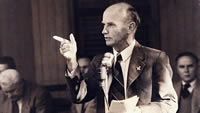Fred Paterson
| Fred Paterson | |
|---|---|
 |
|
| Member of the Queensland Parliament for Bowen |
|
|
In office 15 April 1944 – 10 December 1949 |
|
| Preceded by | Ernest Riordan |
| Succeeded by | Seat abolished |
| Personal details | |
| Born |
Frederick Woolnough Paterson 13 June 1897 Gladstone, Queensland |
| Died | 7 October 1977 (aged 80) Concord, Sydney |
| Political party | Communist |
| Spouse(s) | Lucy Ethel Blackman (m. 1924–1931; divorced) Kathleen Claire (m. 1932–1977; his death) |
| Children | two sons |
| Alma mater |
University of Queensland Merton College, Oxford |
| Nickname(s) | "Red Fred" |
Frederick Woolnough (Fred) Paterson (13 June 1897 – 7 October 1977) was an Australian politician, activist, unionist and lawyer. He was the only member of the Communist Party of Australia to be elected to an Australian parliament.
Paterson was born and raised in Gladstone, Queensland. He was educated at Brisbane Grammar School and then studied classics at the University of Queensland, before joining the military when the First World War broke out. He subsequently saw action on the battlefields of France. While in France, he was involved in two food-related strikes, which were both successful.
In January 1920, Paterson moved to Merton College, Oxford to study theology, after becoming a Rhodes Scholar. However, by the time he sat for his honours degree in 1922, his belief in Christianity had changed. He had witnessed extreme poverty in Ireland and parts of London, and this concerned him. Not long after returning to Queensland, Paterson joined the Communist Party of Australia.
Paterson began studying law in 1923. By 1924, he was giving lectures on Marxism. Then, in 1925, he began working for the Workers' Educational Association. This saw him addressing unions, giving lectures on the history of the working-class, and trying to increase the association's membership.
In 1931, Paterson was admitted to the New South Wales Bar. He based himself in Brisbane, but later that year went to Townsville to defend two Italian workers, who had been charged with assaulting the Italian consul.
As the Great Depression set in, Paterson became involved in fighting racist employment policies in the sugar industry. At the time, the unions and employer associations had a policy of refusing employment to Italian workers to combat unemployment in the industry. Paterson led a campaign by both the Communist Party and the Italian community and was successful in ending the practice. In 1933, Paterson left Brisbane completely, and set up in Townsville. He spent his time juggling both a part-time legal career and his burgeoning role as a travelling activist for the Communist Party. By this time, he had gained a reputation as a fine public speaker.
...
Wikipedia
